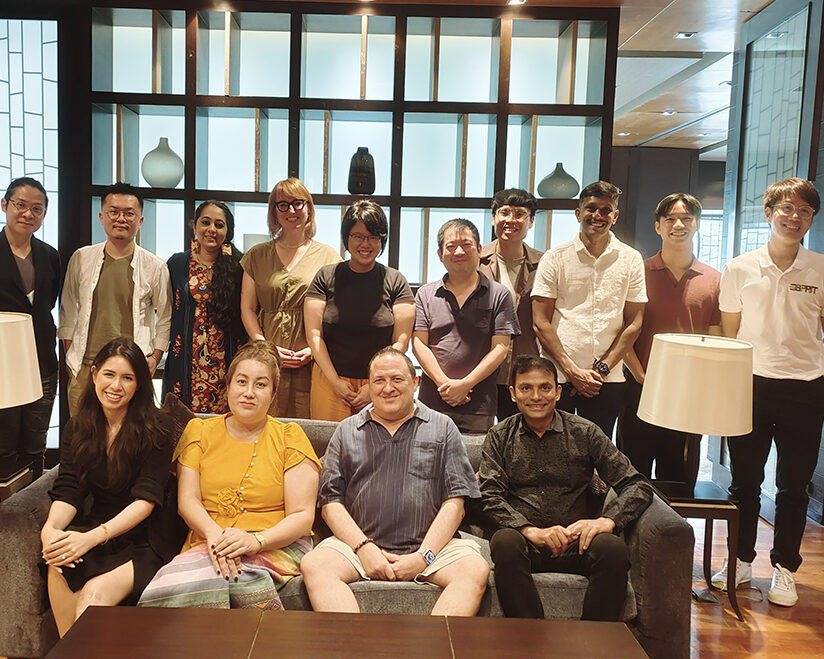Tamil Heritage Month: FIFSW research addressing Tamil communities abroad
Categories: Faculty, Peter Newman, Research
Peter A. Newman (seated, second from right) and Venkatesan Chakrapani (seated on the end, next to Newman) with partners and collaborators in the MFARR-Asia research project. Murali Shunmugam (standing, third from right) is the research manager at C-SHaRP, which Chakrapani leads. C-SHaRP is a key partner of the MFARR-Asia team.
Professor Peter A. Newman’s extensive research addresses global health and human rights, with a focus on HIV and sexual health among sexual and gender minorities and racialized populations. His current work includes a longstanding research partnership with the Centre for Sexuality and Health Research and Policy (C-SHaRP) led by Dr. Venkatesan Chakrapani. The Centre is based in Chennai, in the state of Tamil Nadu in India.
Chakrapani is a co-investigator on Newman’s SSHRC Partnership Grant (MFARR-Asia). Their work has included a scoping review of LGBTQI+ people’s health across the vast expanse of India, the world’s most populous country, and an examination of the challenges faced by transgender people in India during Covid-19. Supported by this partnership, Dr. Chakrapani led the first public facing national LGBTIQ+ health conference in India. The conference report, co-authored by Prof. Newman, led to the first national inclusion of gender affirming surgery in the Prime Minister’s healthcare plan, providing access to 100s of thousands of trans people across India.
Below are two recent studies highlighting the research team’s work.
Identifying and addressing knowledge gaps in LGBTQI+ health in India
There has been incremental legal and policy-based progress for lesbian, gay, bisexual, transgender and queer-identified people in India. More research is needed to inform future change in the region and fill gaps in knowledge of LGBTQI+ health. To address this, Newman and his colleagues conducted a scoping review to identify where knowledge gaps exist and to provide recommendations for future work.
Their findings suggest that LGBTQI+ health research in India needs to move beyond a predominant focus on HIV and gay men and transgender women to include mental health and non-communicable diseases and individuals across the LGBTQI+ spectrum. The researchers argue that future work should build on largely descriptive studies to include explanatory and intervention-based research. They also point to the importance of moving beyond urban to rural sites and examining the healthcare and service needs among LGBTQI+ people across the life course.
Chakrapani, V., Newman, P. A., Shunmugam, M., Rawat, S., Mohan, B. R., Baruah, D., & Tepjan, S. (2023). A scoping review of lesbian, gay, bisexual, transgender, queer, and intersex (LGBTQI+) people’s health in India.PLOS Global Public Health, 3(4): e0001362.
Covid-19’s impact on the well-being and health outcomes of Transgender women in India
Ranked second worldwide in the number of people diagnosed with Covid-19, India has been significantly impacted by the pandemic, and, like elsewhere, communities on the margins have been disproportionately affected. With two decades of experience conducting research and providing services to sexual and gender minority communities, Venkatesan Chakrapani, Peter A. Newman and colleagues are able to draw on extensive knowledge to identify the challenges faced by this population.
The researchers have highlighted how the lockdowns associated with the pandemic disrupted the meager sources of income of many transgender women including Hijras, who largely rely on money from providing blessings, begging and sex work. For Hijras engaged in sex work, challenges to negotiating condom use and adhering to Covid-19 protective measures increase risks for contracting HIV and Covid-19 amid decreased access to HIV services. Many transgender women face challenges accessing Covid-19–related government welfare programs as they lack legal gender identity documents. The authors argue that multisectoral and transgender-competent approaches are needed to mitigate the ongoing impacts of the pandemic, and to prepare for future public health emergencies.
Chakrapani, V., Newman, P. A., Sebastian, A., Rawat, S., Shunmugam, M., & Sellamuthu, P. (2022). The impact of COVID-19 on economic well-being and health outcomes among transgender women in India [Perspectives]. Transgender Health, 7(5), 381–384.
Visit Mobilizing for a Research Revolution to Ensure LGBTIQ Inclusion’s website to learn more about the SSHRC Partnership Grant-supported research project.
